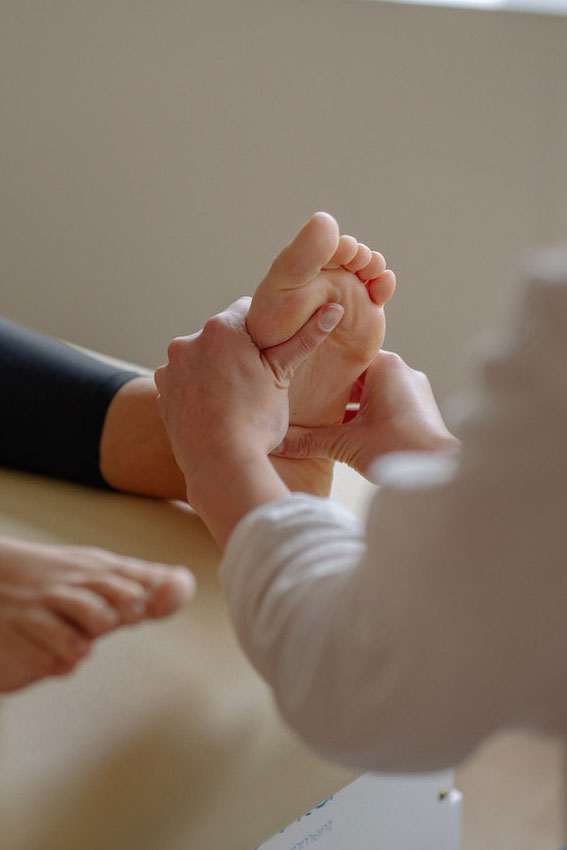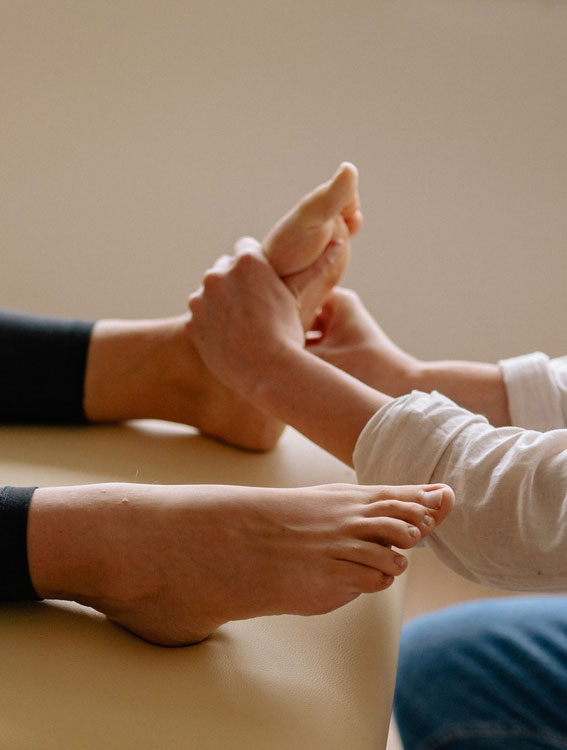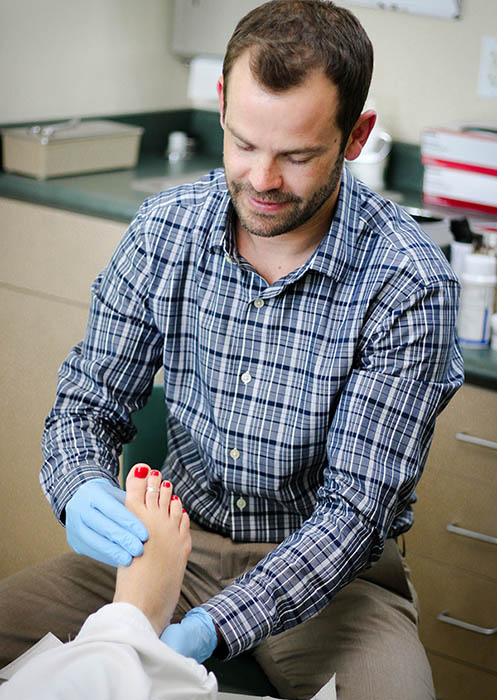Bunions Podiatry
Bunions are a widespread foot condition affecting comfort, mobility, and independence. However, only some doctors can treat them. Foot and ankle specialists, podiatrists, and orthopedic surgeons are qualified to treat bunions.
At Foot & Ankle Center, Dr. Cameron is a rare combination of a podiatrist, surgeon, and the region’s top foot and ankle specialist. Because of his extensive education as a podiatrist with board certification in foot and ankle surgery, he’s among the best bunion specialists.
When possible, Dr. Cameron prefers to avoid surgical interventions. He knows it is possible to avoid invasive surgeries with other bunion help and treatments and would like to help you before it comes to that. Whether you need custom orthotics to help relieve pain or surgical bunion cure, you’re in capable, experienced hands with Dr. Cameron.
What Are Bunions?
Typically forming at the base of your big toes, bunions are bony prominences that can cause pain and discomfort and impact your gait and ability to walk.
You may think bunions are a problem when you age, but they can happen anytime. It is also possible to have asymptomatic bunions, meaning you don’t have any noticeable symptoms or discomfort. You can also have bunions develop without any direct cause; however, here are some of the risk factors contributing to bunion development:
- Your Gender
Women can be more prone to bunions, which may have something to do with more constricting footwear, such as ballet flats that pinch the feet, or high-heeled shoes. - Your Choice of Footwear
No matter your gender, if you wear a shoe with an elevated heel or narrow or tight footwear, you can put undue pressure on your toes, creating bunions over time. - Genetics
Unfortunately, bunions can run in families. Certain foot features like low arches or flat feet can be genetic and lead to the development of bunions. - Injuries
Even minor injuries you’ve quickly forgotten about, like a sprain, can cause structural changes to your feet, resulting in bunions. However, it is more likely to happen after fractures. - Medical Conditions
If you have gout, rheumatoid arthritis, diabetes, or struggle keeping your weight down, you have a higher risk of bunions.


What Helps Bunions?
Whether you are trying to prevent bunions or already have bunions, wearing comfortable, supportive shoes will help. They should have a wide toe box to reduce discomfort and pressure around your big toes. Wear shoes with minimal heels, if any, to avoid extra toe pressure. You should get your feet measured to ensure you are wearing the correct size and width of the shoe as well.
If you already have bunion pain, treatments you can do at home include applying ice and taking a nonsteroidal anti-inflammatory drug (NSAID) to reduce inflammation and relieve pain. Aspirin and ibuprofen are the two NSAIDs you can buy without a prescription.
If your bunions are minor or severe, you should see a bunion specialist, especially if they are causing you pain. They can recommend a treatment plan to help your bunions, reducing your daily discomfort and correcting any underlying issues worsening the conditions of your feet.
Podiatry For Bunions: What To Expect
Sometimes it’s easier to take the first step to getting treatment if you know what’s coming. To recommend the best treatment for your bunion pain, podiatrists like Dr. Cameron need to gather some crucial information:
- Medical History
He will take a medical history about any previous injuries or other foot conditions and whether there’s a family history of foot problems. - Physical Exam
Next, he will examine your feet. He is looking for abnormalities like alignment issues in your toes, feet, and ankles. He will note any swelling, inflammation, or redness around your bunions. He will want to know about your pain: Is it daily? What exacerbates it, and what relieves it? - Gait Assessment
Dr. Cameron will need to analyze your gait. In lay terms, he will want to see how you walk. Your physical exam may not show anything abnormal when sitting, but your foot movements while walking can contribute to bunions forming. - Potential Imaging
When warranted, bunion specialists need to send you for an x-ray. Dr. Cameron will help you understand the reasoning for this procedure pertinent to your case. X-rays can help identify underlying structural problems in your feet and assess the severity of your bunions, especially if surgery is necessary.


Bunion Cures
You may need to invest in a different pair of shoes in mild cases. A bunion specialist can also prescribe special shoes or inserts, such as custom orthotics, to help reduce pressure and align your feet appropriately at rest and when walking.
Depending on the cause, physical therapy can also help bunions; you can practice specific exercises to strengthen the muscles around your bunion and improve joint flexibility. However, these bunion cures are less likely to help moderate to severe bunions. Podiatrists classify these as foot deformities and may require more intense bunion pain treatment.
If your bunions have surpassed the mild stage, you may require bunion surgery to correct them. A foot and ankle surgeon performs a procedure, removing your bunion and realigning your affected joint. They may also repair soft tissue to reinforce and stabilize the joint. This will help prevent a bunion from forming again. In extreme cases, they can perform a joint fusion to stop future movement and further damage.
Depending on the type of bunion surgery, recovery can take weeks to months. Your podiatrist may prescribe physical therapy for foot strength and mobility after the first few weeks. Medical professionals don’t consider surgery lightly, nor should you; once they have cured your bunion, you must take the necessary steps to prevent it from developing again.
Why Choose Foot & Ankle Center For Bunion Podiatry
Beyond his impressive qualifications, Dr. Cameron has committed to every one of his patients in the St. George region since 2016, helping them with their foot ailments. He will assess your individual needs and develop a treatment plan that works within your lifestyle to address your bunions and overall foot concerns.
Your comfort, health, and quality of life are priorities. He will explore all viable options to help your bunions before considering more severe operations, a rare trait for a surgeon.
His ethos is rooted in avoiding regret and unnecessary surgeries with prevention and early intervention. The earlier you can get into a bunion podiatry clinic, the better. Most bunion surgeries are avoidable if the necessary identification happens early enough to intervene with minimally invasive treatments.
Don’t be weighed down with the daily struggle of your bunions or burdened with the pain of regret by not getting them treated sooner. Call Foot & Ankle Center for a consultation today.
